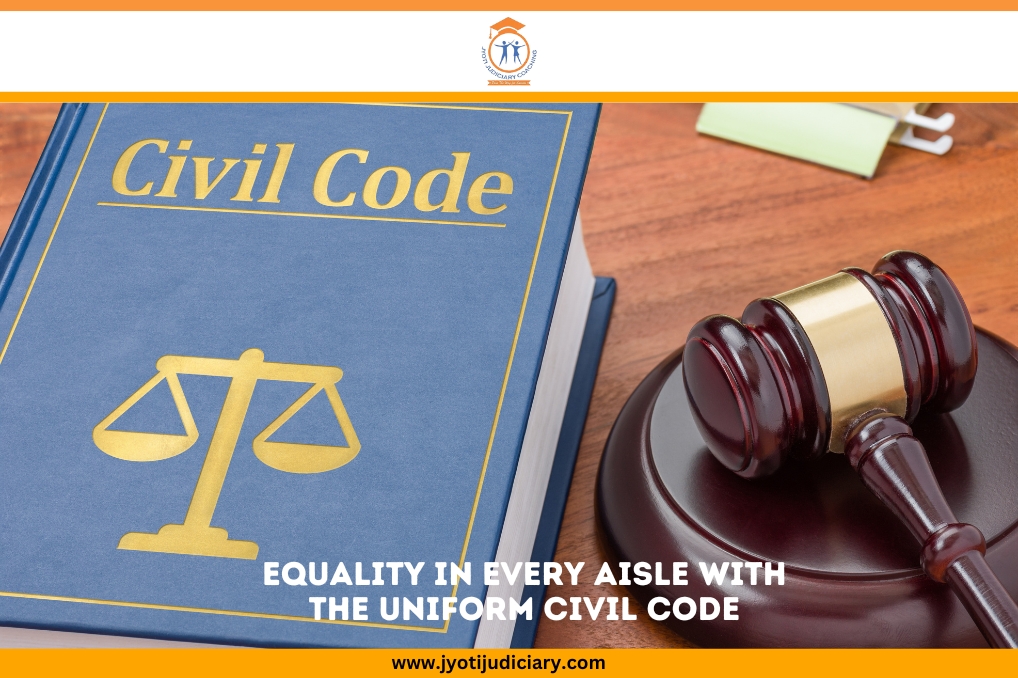
In India, where plurality and diversity are cherished, pursuing equality is not just ethically acceptable but also required by the constitution. The idea of equality, which depends on the principles of fairness and equity, is essential to the spirit of a nation that is democratic. However, achieving equality requires an extensive approach that goes beyond straightforward legal requirements and investigates the fundamentals of cultural norms and practices. Establishing the concept of a uniform civil code (UCC), which ensures equality in all facets of our diverse society, is one such important element.
Uniform Civil Code
It is a proposal to create a single, standard legal framework for all Indian citizens by replacing the personal laws of each community. If the Code is put into effect, it will take the place of the current personal laws, which differ according to religious affiliation.
Article 44 of the Indian Constitution
- According to Article 44 of the Directive Principles of State Policy, the State would make every effort to ensure that all Indian people have access to a common civil code.
- Article 44 Uniform Civil Code indicates that although the Directive Principles of State Policy are intended to direct the State in formulating policy, they do not have legal enforceability.
About the Uniform Civil Code
- As per the definition of a uniform civil code, it is envisioned as a body of legislation that regulates all people’s personal affairs, irrespective of their faith, including adoption, marriage, divorce, inheritance, and succession.
- It seeks to supersede the several personal laws now in effect that differ according to religious affiliation.
Uniform Civil Code Need and Significance
The significance and need for a uniform civil code are:
- To Boost Equality: A secular democratic nation like India should create universal civil and personal laws for all of its citizens in the current period. Different laws should apply to different classes, castes, genders, racial groups, and religions.
- To Encourage National Integration: With the exception of these personal rules, the court must treat all Indians equally when it comes to criminal and civil laws. Consequently, prejudice between various religious communities can be eradicated by the application of the uniform civil code.
- To Achieve Gender Parity: It is a well-known fact that practically all faiths have personal laws that are skewed toward men. Usually, discrimination against women occurs during inheritance or succession planning. There is a chance that UCC will achieve gender parity.
- To Reduce Gaps in Personal Law: The favoritism of various faiths’ personal rules toward the patriarchal notion of society causes some very grave issues. Common law implementation can close these gaps and remove prejudices among Indian residents.
Uniform Civil Code Issue
- Finding consistency and common ground in the midst of such variation is quite challenging. Furthermore, a lot of personal laws are derived from written or oral sources that are frequently unclear or inconsistent rather than being codified or formalized.
- UCC is seen by many religious and minority groups as an attack on their right to cultural and religious freedom. They worry that UCC will enact a monolithic or majoritarian law that would ignore their diversity and sense of self.
Argument on Uniform Civil Code
Arguments in For:
- We have established a substitute legal system based on tens of thousands of years-old principles by permitting personal laws. The Uniform Civil Code would alter that.
- Religious personal laws are intrinsically misogynistic, and by permitting antiquated religious precepts to continue dictating family life, we are sentencing all Indian women to oppression and cruelty. A Uniform Civil Code will also benefit women’s standing in India.
Arguments Against:
- Because it would intrude upon religious rites and traditions without such communities’ permission, it might potentially violate their right to religious autonomy.
- Diverse societies have diverse customs and sensitivities, which may not be sufficiently accommodated by a single code. The diversity of religious and cultural traditions in India may therefore be hampered as a result.
The uniform civil code in India would be the perfect defense of citizens’ rights. The legislation will be progressive once it is adopted. The need for a Common Civil Code has emerged in response to the evolving needs of all citizens, regardless of faith, in order to safeguard their fundamental rights as guaranteed by the Constitution. Secularism as well as national integrity can also be strengthened by putting UCC into practice.
Uniform Civil Code FAQs
1. What are the arguments against the Uniform Civil Code?
The Uniform Civil Code’s opponents fiercely defend their position against its application, pointing out that it violates the rights of culture and religion that the Constitution’s authors guaranteed to minorities.
2. What are the challenges of the Uniform Civil Code?
The implementation of a Uniform Civil Code (UCC) would violate citizens’ right to freedom of religion by imposing regulations that are inconsistent with their religious practices and beliefs. This could entail government meddling in matters of faith.
3. Who will benefit from the Uniform Civil Code?
Since all Indian residents are subject to the same criminal and civil laws (apart from personal laws), they are already treated equally in court. The Uniform Civil Code will be put into effect, giving every citizen access to the same personal laws.
4. Why are Muslims against UCC?
The All India Muslim Personal Law Board said that every citizen is entitled to practice and confess his faith and religious beliefs, as well as to act upon and propagate them, and that the Uniform Civil Code is not appropriate nor helpful for a large, multi-religious nation like India. India is a multi-religious country.
5. Is UCC good or bad?
India’s secularism would be strengthened with a unified civil code. The integrity of the country and the equality of genders and religions depend on UCC. UCC would guarantee women equal chances and safeguards by doing away with discriminatory practices that deny them their rights.
6. What will happen if UCC is implemented?
India is a multi-religious nation with diverse customs and practices. India will become more integrated than it has ever been since independence with the aid of a unified civil code. It will assist in introducing religion to every Indian, regardless of caste.
7. Which is the only state with a Uniform Civil Code?
The Uniform Civil Code in Uttarakhand was initially implemented. The Uttarakhand assembly debated the UCC bill for two days before passing it by voice vote. The only other state with UCC, after it was implemented by the Portuguese in 1867, was Goa.
8. Why do Muslims oppose CAA?
Muslims were especially concerned that the law might be used against them in conjunction with a planned citizenship registry. One aspect of the Modi government’s attempt to track down and remove individuals it believes entered India illegally is the National Register of Citizens.
9. Why is UCC not in India?
By supplanting distinct religious rules with a unified code, a UCC might jeopardize India’s unique religious and cultural diversity. They worry that it could weaken the nation’s cultural fabric and restrict freedom of religion.
10. Which coaching is best for the judiciary?
Jyoti Judiciary Coaching offers the best judiciary coaching available in Jaipur. Its objective is to furnish the students with a comfortable learning atmosphere. It raises the probability of reaching the intended result by making the challenging task seem simple. Our mission at Jyoti Judiciary is to provide you with the best education we can. The Institute guarantees that it will make every effort to give you the best possible preparation for the Judicial Service entrance exams.
11. Which coaching is best for RJS preparation?
The reputable Jaipur coaching program “Jyoti Judiciary Coaching” aids students in getting ready for the RJS exam. The best both online and offline RJS coaching program in Jaipur, Jyoti Judiciary, enables a methodical approach to RJS examination preparation. With great care, their curriculum has been created to include every topic and course required to pass the Rajasthan Judicial Service Exams.
With the goal of giving students the best coaching available for law entrance exams including the CLAT, AILET, and various other numerous state judiciary exams, Jyoti Judiciary Coaching, India’s Finest educational Platform, was established. Come enroll now with Jyoti Judiciary!
For any latest news, legal topics, judiciary exams notifications, patterns, etc watch Jyoti Judiciary’s YouTube channel for legal videos for any updates at https://youtube.com/@jyotijudiciarycoaching4852?si=2cwubh9d2A9urwJf









